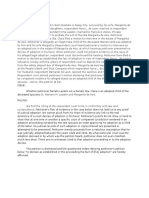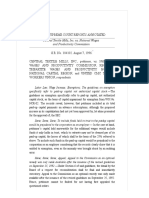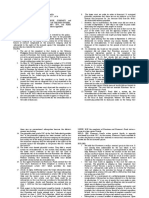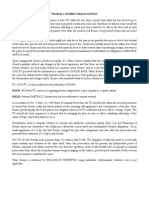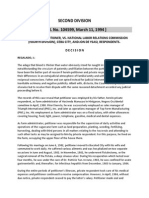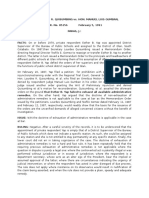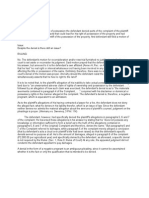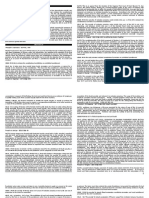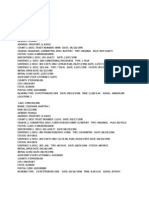0 ratings0% found this document useful (0 votes)
248 viewsImson-Souweha Vs Rondez
Imson-Souweha Vs Rondez
Uploaded by
juris_- Complainant Salud Imson-Souweha charged respondent lawyer Teopisto Rondez with forging her signature on an extrajudicial settlement regarding her deceased parents' estate.
- Rondez claimed he notarized the document in good faith, believing assurances from Souweha's sisters that they had power of attorney to sign for her since she was abroad.
- The IBP found Rondez acted in good faith and absolved him of wrongdoing, but reprimanded him for conflict of interest in representing parties to the estate dispute. The Supreme Court adopted the IBP's findings and resolution.
Copyright:
© All Rights Reserved
Available Formats
Download as PDF, TXT or read online from Scribd
Imson-Souweha Vs Rondez
Imson-Souweha Vs Rondez
Uploaded by
juris_0 ratings0% found this document useful (0 votes)
248 views6 pages- Complainant Salud Imson-Souweha charged respondent lawyer Teopisto Rondez with forging her signature on an extrajudicial settlement regarding her deceased parents' estate.
- Rondez claimed he notarized the document in good faith, believing assurances from Souweha's sisters that they had power of attorney to sign for her since she was abroad.
- The IBP found Rondez acted in good faith and absolved him of wrongdoing, but reprimanded him for conflict of interest in representing parties to the estate dispute. The Supreme Court adopted the IBP's findings and resolution.
Original Description:
Legal Ethics Case - Full text
Original Title
Imson-souweha vs Rondez
Copyright
© © All Rights Reserved
Available Formats
PDF, TXT or read online from Scribd
Share this document
Did you find this document useful?
Is this content inappropriate?
- Complainant Salud Imson-Souweha charged respondent lawyer Teopisto Rondez with forging her signature on an extrajudicial settlement regarding her deceased parents' estate.
- Rondez claimed he notarized the document in good faith, believing assurances from Souweha's sisters that they had power of attorney to sign for her since she was abroad.
- The IBP found Rondez acted in good faith and absolved him of wrongdoing, but reprimanded him for conflict of interest in representing parties to the estate dispute. The Supreme Court adopted the IBP's findings and resolution.
Copyright:
© All Rights Reserved
Available Formats
Download as PDF, TXT or read online from Scribd
Download as pdf or txt
0 ratings0% found this document useful (0 votes)
248 views6 pagesImson-Souweha Vs Rondez
Imson-Souweha Vs Rondez
Uploaded by
juris_- Complainant Salud Imson-Souweha charged respondent lawyer Teopisto Rondez with forging her signature on an extrajudicial settlement regarding her deceased parents' estate.
- Rondez claimed he notarized the document in good faith, believing assurances from Souweha's sisters that they had power of attorney to sign for her since she was abroad.
- The IBP found Rondez acted in good faith and absolved him of wrongdoing, but reprimanded him for conflict of interest in representing parties to the estate dispute. The Supreme Court adopted the IBP's findings and resolution.
Copyright:
© All Rights Reserved
Available Formats
Download as PDF, TXT or read online from Scribd
Download as pdf or txt
You are on page 1of 6
THIRD DIVISION
[ A.C. No. 3961, September 18, 1997 ]
SALUD IMSON-SOUWEHA, COMPLAINANT, VS. ATTY. TEOPISTO A. RONDEZ,
RESPONDENT.
R E S O L U T I O N
FRANCISCO, J.:
After this Court, per Resolution dated January 27, 1993, referred to the Integrated Bar of the
Philippines (IBP) the affidavit-complaint of herein complainant SaludImson-Souweha against
respondent Atty. Teopisto A. Rondez who filed a comment thereon, the IBP Board of Governors
issued Resolution No. XII-97-10 dated May 17, 1997 adopting and approving the Report of
Investigating Commissioner Plaridel C. Jose, the decretal porti on of which reads:
WHEREFORE, it is hereby recommended that the respondent be absol ved from the
complainants charge of violating his notarial duties and responsibility. However, the
respondent should be strongly REPRIMANDED for appearing in the aforementioned Civil Case
No. 2606-R with conflict of interest.
In a nut shell, complainant Souweha charged respondent Atty. Rondez of being a privy, or
instrumental, in the forgery of her signature appearing in the Extrajudicial Settlement of the
Estate of her deceased parents purportedly agreed upon by her fathers (AnastacioImson) two
sets of children with his first and second wives. She claims that she could not have signed (not
has she authorized anybody to sign in her behalf) said agreement as she was in the United
States. Complainant Souweha thus accused respondent Atty. Rondez, in having notarized the
extrajudicial settlement despite her absence, of failing in his legal duties and responsibilities
and violating his lawyers oath, by (1) causing it to appear that persons have participated in any
act or proceeding when they did not in fact so participate; (2) attributing to persons who have
participated in any act or proceeding statements other than those in fact made by them; and
(3) making untruthful statements in narration of facts.
Respondent, on the other hand, claimed close friendship with deceased AnastacioImson and in
having personally informed complainant Souweha during a conference with AnastacioImsons
children held after the burial, to secure a tax account number necessary in the preparation of
the extrajudicial settlement, complainant being known to respondent as permanent resident of
the U.S. Respondent also claimed that on the date he presented to the children the deed of
extrajudicial settlement which he prepared for their signatures, two (2) of complainants sisters
(Lydia Imson-Sinlao and Flora Imson-Elvina) assured him that the complainant, who had to
leave for the US, had already executed a Special Power of Attorney in their favor to affix her
signature on said deed. Respondent had to leave for a pressing appointment, and when he
returned and upon seeing the signatures of all the children already affixed on the deed,
respondent then notarized the same.
The Court agrees with, and hereby adopts, the IBPs finding that respondent, in essence, acted
in good faith in connection with his participation in/approval of the extrajudicial settlement.
Thus:
From the foregoing premises, herein respondent could not have been at fault or deemed to
have violated his oath as a commissioned notary public on account of complaints non-
appearance or absence when she acknowledged the deed of settlement as her voluntary act
and deed. Because of respondents close relationship with the Imson family and the assurances
of the complainants sister Flora Imson-Elvina and Lydia Imson-Salud (sic) that they have the
written authority of the complainant to sign on her behalf, respondent thus notarixed (sic) the
questioned document believing in good faith the representations (sic) of complainants sisters
Flora Imson-Elvina and Lydia Imson-Sinlao that they have the written authority of their sister
SaludImson-Souweha. If respondent is to be faulted at all, it is simply because of his complete
trust and confidence on the heirs of Anastacio, particularly Flora Imson-Elvina and Lydia Imson-
Sinlao whom the respondent never suspected would commit the grievous scheme of
misenterpreting themselves as the representatives of the complainant in the matter of the
settlement of the deed.
As a matter of fact, complainant had, by her manifest conduct, reiterated having given her
sisters authority to sign on her behalf. Her two sisters had on several occasions declared that
they have the requisite authority. If it is in writing, then it can only be presumed that they have
suppressed or refused to give a copy to the herein respondent to serve their malicious design.
Or if indeed no written authority exists, then SaludImsonSouweha must have instructed her
sister to sign it for her before she left for the United States. To allege that respondent forced
her signatures on the deed is a grievous and unconscionable assault on the personal honor,
integrity and reputation of herein respondent.
Respondent is of the belief that the complaint in the case at bar was initiated by the
complainant in the light of the recent legal reverses which was suffered by her brother and
sisters as against their half brothers and half sisterMrs.Orlino. Complainant SaludImson-
Souweha is being used by his brothers and sisters, as well as her brothers and sisters -in-laws as
their instrument of revenge or hate. It is obvious that the complaint was prepared for her in
Baguio City although sworn to before the Philippines (sic) consulate in New York.
If indeed SaludImson-Souweha never signed the deed because she was not personally present
to sign the same or never authorized anybody to sign on her behalf, she is deemed, however, to
have ratified the document by her subsequent actuations. SaludImsonSouweha was in Baguio
City for a vacation during the months of July and August, 1992, collected and received her equal
share of back rentals for a period of eighteen (18) months equivalent to her 1/12 interest in the
property which was leased by the other heir, a proprietary interest which she acquired by
virtue of the Deed of Extra-Judicial Settlement. She now alleges that the respondent is
instrumental in the forgery of her signatures on the document where she derives her equal
share in the property.
Respondent pleads to cite recent court reversals suffered by SaludImson-Souweha and her
brother and sisters, as well as recent revelations on their personal and collective filiation, thus:
(a) In Civil Case No. 2606-R, pending before the Regional Trial Court of Baguio, Branch 5,
complainants group of heirs filed on August 11, 1992, a suit to enjoin and/or to terminate the
lease of their half-brothers and half-sister over the property subject, of thei r extra-judicial
settlement. The Court, in its order dated September 9, 1992 denied their attempt to secure
such injunction from the court, a copy of said order herein attached as Annex 2
(b) Salud B. ImsonSouweha, her brothers and sisters insisted on the clients of the respondent
that they are the majority co-owners of the properties they inheri ted from their late father
since they outnumber the five (5) legitimate children (see paragraph II) if they are to share
equally the said properties. It turned out, however, complainant and her brothers and sisters
are not even legitimate and that two (2) of them are not even children of their late father. The
eldest, Lourdes B. Imson-de Jesus and Ricardo B. Imson, are not children of the late
AnastacioImson, Sr., and the five (5) others are illegitimate children, their late mother not being
married to Anastacio.
Respondent could only surmise that the finding of the illegitimate filiation of the complainant
and her brothers and sister and the non-filiation of Lourdes and Ricardo to thei r late father
could have provoked the filing of this administrative complaint against the respondent who was
responsible for the foregoing discovery by his own research of the official record.
(c) SaludImsonSouweha was on vacation in Baguio City in July and August, 1992. Her desire to
join the business venture of the five (5) legitimate heirs of the first group in operating the night
club-restaurant jointly owned was rebuffed. Thus, she was most likely the instigator in the filing
of Civil Case No. 2606-R on August 17, 1992. The heirs leasing the property owned in common
was rented for Twenty Five Thousand Pesos (P25, 000.00) since March 1991 up to the present.
SaludImson-Souweha (sic) share of Two Thousand Pesos (P2,000.00) from the monthly rental
was collected by her, and received and signed for by any of her sisters. For the months of July
and August, 1992, she personally received and signed for her share, as can be shown by the
attached Annexes 3 and 4;
(d) Lastly, before leaving for the United States in August, 1992, she signed a Special Power of
Attorney and Memorandum of Agreement, authorizing the sale of her 1/12 interest in the
property under lease, granted to ConstancioImson and Emmanuel Orlino as per Annexes 5
and 6, respectively;
- - - pp. 26-38. Supreme Court records.
Without proceeding further, it appears that the present case is a typical example of a
practising lawyer whose family friends and at the same time clients who (sic) succumbed to a
(sic) serious family feuds and litigations over the bounty which they inherited from their
predecessors as a consequence of which the lawyer is caught between the cross -fire of the
factions that led to the filing of an administrative case against him under the belief that the
problem arouse out of the fault of the family lawyer.
As admitted by the respondent in his aforementioned quoted Comment:
If respondent is to be faulted at all, it is simply because of his complete trust and confidence on
the heirs of Anastacio, particularly Flora Imson-Elvina and Lydia Imson-Sinlao whom the
respondent never suspected would commit the grievous scheme of misrepresenting
themselves as the representatives of the complainant in the matter of the settlement deed.
- - -page 34, Supreme Court record.
From the various pleadings, affidavits and testimonies submitted to this Commission there is
no doubt that the late Spouses AnastacioImson and his two wives (the fist legitimate and the
second as common law) as well as their respective children became close family friends and
clients of the respondents.
As stated earlier herein the family feud created two factions, the first group is composed of
the children of anastacioImson and Rosario Dizon, who are legitimately married, namely
Constancio, Virgilio, Zenaida, Jose and Erlinda. And the second group is composed of Salud (the
herein complainant), Flora, Lydia, Lourdes, Ricardo, Perla, and Fely, the children with
Anastacios common-law-wife Angustia Braganza. Only Salud is the complainant in the present
administrative case. The other members of her group never intended much less filed or joined
Salud in this case against respondent. From all indications, the present case as well as the civil
cases (Exhibit B-6 and B-9) hereafter discussed sprouted because of the usual greed and
selfish (sic) which prevailed over the sense of fairness and decency on the part of the
complainant Salud B. Imson-Souweha. Otherwise, the family place is (sic) will remain
unperturbed.
Aside from acting in good faith as his defense for notarizing the aforementioned Extrajudicial
Settlement making it appear that all the signing parties therein appeared before him, with Flora
appearing as the authorized person in signing the name of Salud, respondent's other defense is
the act of Salud of having ratified said Extrajudicial Settlement when she kept on receiving the
rentals from the Anastacio Club equally with her siblings of the first group and the second
group after the execution of the said settlement and which sharing is in accordance with the
provisions of the said settlement.
To this Commission, however, the ulti mate proof of Saluds act of having ratified the said
Extrajudicial Settlement in her tacit acceptance of the cancellation of the OCT No. P-378 (Exhibit
B-4) which was then registered in the name of the deceased AnastacioImson and the issuance
in lieu thereof of the new TCT No. T-54449 (Exhibit A-9) in the name of the first and second
group of children of the said Anastacio in equal undivided shares. The issuance of the Exhibit
A-9 was never questioned by any of the heirs much less subjected to any action for rescission.
On top of that, the issuance of the said TCT No. T-54449 was based on the very deed of the
Extrajudicial Settlement which was notarized by the respondent and now being used as the
main evidence of the complainant. The said Extrajudicial Settlement was annotated on the
dorsal side of Exh. A-9.
Not only that. The said act of ratification was strengthened by the Petiti on for Injunction
docketed as Civil Case No. 2606-R (Exh. B-5) filed by the second group of children namely,
Lourdes, Ricardo. Lydia, Flora, Perla, Fely, and Salud (complainant herein) against Constacio,
Virgilio, Zenaida, Jose, and Erlinda which was based on Salud, et. als. Claim of registered co-
ownership with the group in TCT No. T-54449 (Exh. A-9) as shown by the pertinent allegation
in the Petition admitting undivided equal shares of the said parcel of land covered by TCT No. T-
54449, which reads:
That the petitioners (7) and the respondents (5) are the CO-OWNERS IN EQUAL SHARES of a
parcel of residential land together with all the improvements thereon located along Magsaysay
Ave., Baguio City covered by Transfer Certificate of Title No. T-54449 issued by the Register of
Deeds of Baguio City on November 26, 1990.
Attached hereto is a copy of the Transfer Certificate of Title in the names of the petitioner and
the respondents as Annex A and made an integral part hereof
- - - page 26, Supreme Court records.
With the said act of ratification and admission of equal sharing contained in the said TCT No. T-
54449, (Exh. A-9), we can safely say that the present administrative case has become moot
and academic. While this Commission is inclined to impose a sanction on the act of the
respondent in certifying in his notarial act that Salud personally appeared before him on the
date of the execution of the said Extrajudicial Settlement there is a serious doubt based on the
testimony of her sister ZenaidaOrlino (pages 39-42, TSN of December 9, 1994), that indeed
Salud authorized Flora to sign her name on the said Extrajudicial Settlement and the said doubt
should be ruled in favor of the respondent. For the record, let it be known that this
Commission, however, is aware of the jurisprudence the pertinent portion of which reads as
follows:
The claim or belief of Atty. Dela Rea that the presence of petitioner Gamido was not necessary
for the jurat because it is not an acknowledgment is patently baseless. If this had been his belief
since he was first commissioned as a notary public, then he has been making mockery of the
legal solemnity of the oath in a jurat. Notaries public and other authorized by law to administer
oath or to take acknowledgments should not take for granted the solemn duties appertaining
to their offices. Such duties are dictated by public policy and are impressed with public interest.
His prior acquaintance and friendship with petitioner Gamido provides no excuse for non-
compliance with his duty. If Atty. Dela Rea were faithful to his duty as a notary public and if he
wanted to accommodate a friend who was inside a prison, he could have gone to the latters
cell since he openly admitted that he has been in out of New Bilibid Prisons, not only because
[his] office is here only across the Municipal Building of Muntinlupa, Metro Manila but because
[he] handled a number of cases involving prisoners and guards of NBP as well as some of its
personnels *sic+.
[1]
We note, however, that the penalty of Reprimand was imposed on respondent not on the acts
complained of by complainant involved in this case, but on account of the motuproprio findi ng
of the investigating commissioner that respondent is guilty of having represented the
conflicting interests of the late AnastacioImsons two sets of children. This cannot be done
without seriously violating the very fundamental and constitutionally protected right of a
person to be informed of the nature of the charge for which he is being held accountable
(Section 14
[2]
, Article III of the 1987 Constitution). To repri mand respondent in this case is,
therefore, not in order.
WHEREFORE, this administrative case filed against respondent Atty. TeopistoRondez is hereby
DISMISSED.
SO ORDERED.
Narvasa, C.J., (Chairman), Romero, Melo and Panaganiban, JJ., concur.
[1]
Report of IBP Investigating Officer Plaridel C. Jose, pp. 10-16.
Source: Supreme Court E-Library
This page was dynamically generated
by the E-Li brary Content Management System (E-Li bCMS)
You might also like
- Golden KeyDocument18 pagesGolden KeyDemetrius New El100% (7)
- Payment Agreement FormatDocument4 pagesPayment Agreement FormatojasNo ratings yet
- Annex B-2 RR 11-2018Document1 pageAnnex B-2 RR 11-2018Patricia Irene PanganNo ratings yet
- Limitation Bars Remedy But Does Not DestroyDocument12 pagesLimitation Bars Remedy But Does Not DestroyRaghav Daga89% (9)
- 49940annex A-Rmo26 - 2010Document3 pages49940annex A-Rmo26 - 2010Eljoe VinluanNo ratings yet
- Republic of The Philippines Manila Third Division: Supreme CourtDocument8 pagesRepublic of The Philippines Manila Third Division: Supreme CourtmjNo ratings yet
- September 27. Conflict of LawsDocument5 pagesSeptember 27. Conflict of LawsCristian RamirezNo ratings yet
- Spec ProDocument26 pagesSpec ProLyra Aguilar100% (1)
- Bernardo Vs CADocument1 pageBernardo Vs CARegion 6 MTCC Branch 3 Roxas City, CapizNo ratings yet
- Digested Case Barroga V AlbanoDocument1 pageDigested Case Barroga V AlbanoBebert Thirdie Artuz CordenilloNo ratings yet
- Asnar Vs Sps YbanezDocument19 pagesAsnar Vs Sps YbanezCharmaine MejiaNo ratings yet
- Heirs of Marcelo Sotto vs. PalicteDocument2 pagesHeirs of Marcelo Sotto vs. Palictedar080No ratings yet
- Coronel Vs Court of Appeals PDFDocument7 pagesCoronel Vs Court of Appeals PDFDianalyn QuitebesNo ratings yet
- Sps. Baysa vs. Sps PlantillaDocument13 pagesSps. Baysa vs. Sps PlantillaEunice NavarroNo ratings yet
- Case No. 21 Qua Chee Gan Vs Law Union and Rock Insurance CoDocument2 pagesCase No. 21 Qua Chee Gan Vs Law Union and Rock Insurance CoA Paula Cruz FranciscoNo ratings yet
- 10 Enriquez vs. Sun Life Insurance of Canada G.R. No. 15895 Nov. 29 1920 ScraDocument5 pages10 Enriquez vs. Sun Life Insurance of Canada G.R. No. 15895 Nov. 29 1920 ScraJNo ratings yet
- SPECIAL PROCEEDINGS Case Doctrines 1Document1 pageSPECIAL PROCEEDINGS Case Doctrines 1Himura KenshinNo ratings yet
- O - FFCruz Co Vs Court of Appeals 164 SCRA 731Document4 pagesO - FFCruz Co Vs Court of Appeals 164 SCRA 731sigfridmonteNo ratings yet
- Lazatin Vs CamposDocument1 pageLazatin Vs CamposRomela CepedaNo ratings yet
- Radiowealth Finance Company vs. PalileoDocument4 pagesRadiowealth Finance Company vs. PalileoNullus cumunisNo ratings yet
- Cases in PremiumDocument8 pagesCases in PremiumChristine Jane Amancio RodriguezNo ratings yet
- 014-Benguet Consolidated Mining Co. vs. Pineda 98 Phil 711 (1956)Document15 pages014-Benguet Consolidated Mining Co. vs. Pineda 98 Phil 711 (1956)wewNo ratings yet
- Abrigo V de Vera, 432 SCRA 544Document18 pagesAbrigo V de Vera, 432 SCRA 544Enma KozatoNo ratings yet
- In Re ParazoDocument2 pagesIn Re ParazoEda Marie Enclonar100% (1)
- 10) Rizal Surety & Insurance Co. vs. Manila Railroad Company, 23 SCRA 205, No. L-24043 April 25, 1968Document4 pages10) Rizal Surety & Insurance Co. vs. Manila Railroad Company, 23 SCRA 205, No. L-24043 April 25, 1968Alexiss Mace JuradoNo ratings yet
- NAGA-PEMA Vs NASECO DIGEST - Case DigestsDocument3 pagesNAGA-PEMA Vs NASECO DIGEST - Case DigestsJetJuárezNo ratings yet
- Adr FinalsDocument3 pagesAdr FinalsCrnc NavidadNo ratings yet
- LTD Review OutlineDocument45 pagesLTD Review OutlineMil RamosNo ratings yet
- Dokumen - Tips - 34 Servicewide Specialists V Ca SolisDocument2 pagesDokumen - Tips - 34 Servicewide Specialists V Ca SolisQueen Ann NavalloNo ratings yet
- MIAA V CADocument5 pagesMIAA V CAChow Momville EstimoNo ratings yet
- Quijano v. Bartolabac Labor StandardsDocument229 pagesQuijano v. Bartolabac Labor StandardsPaula BitorNo ratings yet
- 9 Uy Vs LeeDocument5 pages9 Uy Vs LeeHazelGalamayNo ratings yet
- Chua v. CFI NegrosDocument10 pagesChua v. CFI NegrosAnna LesavaNo ratings yet
- ABS-CBN Broadcasting Corp. vs. CADocument18 pagesABS-CBN Broadcasting Corp. vs. CAw8ndblidNo ratings yet
- (A. Subject Matter) Blue Cross Health Care, Inc. vs. Olivares, 544 SCRA 580, G.R. No. 169737 February 12, 2008Document7 pages(A. Subject Matter) Blue Cross Health Care, Inc. vs. Olivares, 544 SCRA 580, G.R. No. 169737 February 12, 2008Alexiss Mace JuradoNo ratings yet
- Chavez Vs CA DigestedDocument4 pagesChavez Vs CA DigestedDave A ValcarcelNo ratings yet
- Ulep VsDocument14 pagesUlep VsRochen ShairaNo ratings yet
- 042-Universal Mills Corp. vs. Universal Textile Mills, Inc. 78 Scra 62 (1977)Document3 pages042-Universal Mills Corp. vs. Universal Textile Mills, Inc. 78 Scra 62 (1977)wewNo ratings yet
- Remedial Law Part II-JurisdictionDocument13 pagesRemedial Law Part II-Jurisdictionregiedude7No ratings yet
- G.R. No. L-27343 - Singson VDocument18 pagesG.R. No. L-27343 - Singson Vabc defNo ratings yet
- 5 3 Philippine Phoenix Surety v. Woodworks 1967Document1 page5 3 Philippine Phoenix Surety v. Woodworks 1967Alyk Tumayan CalionNo ratings yet
- Arsenio Dizon v. CTA / G.R. No. 140944 / April 30, 2008Document1 pageArsenio Dizon v. CTA / G.R. No. 140944 / April 30, 2008Mini U. SorianoNo ratings yet
- Evidence Digest Jan 1, 2019Document7 pagesEvidence Digest Jan 1, 2019Jillian AsdalaNo ratings yet
- PROTON PILIPINAS v. BANQUE NACIONALDocument2 pagesPROTON PILIPINAS v. BANQUE NACIONALPatrick SantosNo ratings yet
- Central Textile Mills v. National Wages CommissionDocument7 pagesCentral Textile Mills v. National Wages CommissionMelissa AdajarNo ratings yet
- Digest DamagesDocument11 pagesDigest DamagesRussell Marquez ManglicmotNo ratings yet
- 5 Pardo VS Hercules Lumber PDFDocument3 pages5 Pardo VS Hercules Lumber PDFNathalie BermudezNo ratings yet
- Madrigal Transport vs. Lapanday DigestDocument2 pagesMadrigal Transport vs. Lapanday DigestCarlo MarcaidaNo ratings yet
- Fireman's Fund v. JamillaDocument3 pagesFireman's Fund v. JamillaDominique PobeNo ratings yet
- De Joya Vs CADocument2 pagesDe Joya Vs CAElead Gaddiel S. Albuero100% (1)
- Gsis V Villaviza Facts: PGM Winston Garcia, As President and General Manager of The GSISDocument21 pagesGsis V Villaviza Facts: PGM Winston Garcia, As President and General Manager of The GSISptbattungNo ratings yet
- Business Day Vs NLRCDocument3 pagesBusiness Day Vs NLRCAnton JeromeNo ratings yet
- 7.infante V CunananDocument1 page7.infante V CunananReinNo ratings yet
- 5 - Compania Maritima V Insurance CompanyDocument4 pages5 - Compania Maritima V Insurance CompanyLAW10101No ratings yet
- Bar Exam 2018 Labor Law: Suggested AnswerDocument14 pagesBar Exam 2018 Labor Law: Suggested AnswerJANE MARIE DOROMALNo ratings yet
- 04-08.surigao Mineral Reservation Board v. CloribelDocument15 pages04-08.surigao Mineral Reservation Board v. CloribelOdette JumaoasNo ratings yet
- De Lim Vs Sun Life Assurance Company of Canada GR L 15774Document2 pagesDe Lim Vs Sun Life Assurance Company of Canada GR L 15774Simon VertulfoNo ratings yet
- Teves V COMELEC DigestDocument1 pageTeves V COMELEC DigestJezra DelfinNo ratings yet
- Provisional OrdersDocument45 pagesProvisional OrdersPipoy AmyNo ratings yet
- Securities and Regulation Code (SRC) I. Nature: Howey Test Network MarketingDocument1 pageSecurities and Regulation Code (SRC) I. Nature: Howey Test Network MarketingJeremiahN.CaballeroNo ratings yet
- Tupaz v. CA, 475 SCRA 398 24. American Home Insurance v. FF. Cruz & Co., G.R. No. 174926Document36 pagesTupaz v. CA, 475 SCRA 398 24. American Home Insurance v. FF. Cruz & Co., G.R. No. 174926yodachanNo ratings yet
- Alejandro v. Alejandro, Adm. Case No. 4256, Feb 13, 2004, 422 SCRA 527Document6 pagesAlejandro v. Alejandro, Adm. Case No. 4256, Feb 13, 2004, 422 SCRA 527Dailyn JaectinNo ratings yet
- Alejandro V VillarinDocument2 pagesAlejandro V VillarinRuab PlosNo ratings yet
- People v. Pagaspas (2021)Document12 pagesPeople v. Pagaspas (2021)juris_No ratings yet
- Gaw Chin Ty v. Anton Gaw Chua (2021)Document9 pagesGaw Chin Ty v. Anton Gaw Chua (2021)juris_No ratings yet
- Uy-Belleza v. Civil Registrar of TaclobanDocument8 pagesUy-Belleza v. Civil Registrar of Taclobanjuris_No ratings yet
- Licyayo Vs PeopleDocument2 pagesLicyayo Vs Peoplejuris_No ratings yet
- Engr. Ben Lim v. Sulpicio GamosaDocument2 pagesEngr. Ben Lim v. Sulpicio Gamosajuris_No ratings yet
- People Vs TalusanDocument2 pagesPeople Vs Talusanjuris_100% (1)
- V. Spouses Po, 2017, Leonen)Document4 pagesV. Spouses Po, 2017, Leonen)juris_No ratings yet
- Rule 122-125Document8 pagesRule 122-125juris_No ratings yet
- Matibag vs. Benipayo: Ad Interim AppointmentsDocument2 pagesMatibag vs. Benipayo: Ad Interim Appointmentsjuris_No ratings yet
- Rule 111 and 112 DigestsDocument15 pagesRule 111 and 112 Digestsjuris_No ratings yet
- Rule 117 DigestsDocument16 pagesRule 117 Digestsjuris_No ratings yet
- Rule 118 and 119 DigestsDocument21 pagesRule 118 and 119 Digestsjuris_No ratings yet
- Rule 116 DigestsDocument9 pagesRule 116 Digestsjuris_No ratings yet
- Rule 114 DigestsDocument9 pagesRule 114 Digestsjuris_No ratings yet
- Property 452 Reviewer-Case DigestDocument5 pagesProperty 452 Reviewer-Case Digestcezar delailaniNo ratings yet
- 2012 PH-HR Country ReportDocument50 pages2012 PH-HR Country Reportjuris_No ratings yet
- Oblicon - Commentaries by JURADODocument715 pagesOblicon - Commentaries by JURADOjuris_No ratings yet
- In Re BasaDocument2 pagesIn Re Basajuris_No ratings yet
- In Re LontokDocument3 pagesIn Re Lontokjuris_No ratings yet
- De Ysasi III v. NLRCDocument18 pagesDe Ysasi III v. NLRCjuris_No ratings yet
- Famous Writers' Sleep Habits vs. Literary Productivity - VisualizedDocument6 pagesFamous Writers' Sleep Habits vs. Literary Productivity - Visualizedjuris_No ratings yet
- In Re Argosino Part 2Document4 pagesIn Re Argosino Part 2juris_No ratings yet
- Arciaga v. ManiwangDocument5 pagesArciaga v. Maniwangjuris_No ratings yet
- Cordova v. CordovaDocument4 pagesCordova v. Cordovajuris_No ratings yet
- People vs. MaglantayDocument2 pagesPeople vs. Maglantayjuris_No ratings yet
- Catungal Vs Rodriguez DigestDocument2 pagesCatungal Vs Rodriguez Digestjuris_No ratings yet
- Friedman V Bloomberg - 16-1335 2d Cir CT of Appeals - DecisionDocument33 pagesFriedman V Bloomberg - 16-1335 2d Cir CT of Appeals - DecisionC BealeNo ratings yet
- CASE Tan Ying Hong V Tan Sian SanDocument18 pagesCASE Tan Ying Hong V Tan Sian SanIqram MeonNo ratings yet
- People Vs Tac-An, G.R. No. 148000, February 27, 2003Document6 pagesPeople Vs Tac-An, G.R. No. 148000, February 27, 2003j0d3No ratings yet
- Brownmed v. AllsopDocument5 pagesBrownmed v. AllsopPriorSmartNo ratings yet
- Prohibiting Workplace Discrimination by Employers - 2013 SSL Draft, The Council of State GovernmentsDocument3 pagesProhibiting Workplace Discrimination by Employers - 2013 SSL Draft, The Council of State Governmentsbvoit1895No ratings yet
- ASM Handbook of Case Histories inDocument15 pagesASM Handbook of Case Histories inwakayula ongetiNo ratings yet
- Quisumbing vs. GumbanDocument2 pagesQuisumbing vs. GumbanXyra Krezel Gajete100% (1)
- Forum Shopping and ContemptDocument4 pagesForum Shopping and ContemptKim EscosiaNo ratings yet
- Galofa V Nee Bon SingDocument1 pageGalofa V Nee Bon SingMarion KhoNo ratings yet
- J. Tiosejo Investment Corp. v. Sps. Benjamin and Eleanor AngDocument2 pagesJ. Tiosejo Investment Corp. v. Sps. Benjamin and Eleanor AngCourtney TirolNo ratings yet
- Types of Company MeetingDocument21 pagesTypes of Company Meetingsivaganesh_7100% (2)
- Romero Vs CADocument1 pageRomero Vs CAkeithnavaltaNo ratings yet
- Section 18 Constitutional Law, Article IIIDocument48 pagesSection 18 Constitutional Law, Article IIIelainejoy09No ratings yet
- Enrique Morales Vs Abelardo SubidoDocument2 pagesEnrique Morales Vs Abelardo SubidoSyed Almendras IINo ratings yet
- Property Week 11Document27 pagesProperty Week 11Kikoy IlaganNo ratings yet
- Case Digest Labo V ComelecDocument2 pagesCase Digest Labo V Comelecxsar_xNo ratings yet
- Bollington Brass Band FormDocument3 pagesBollington Brass Band Formapi-479464360No ratings yet
- Bill of ConveyanceDocument3 pagesBill of Conveyance:Lawiy-Zodok:Shamu:-El83% (6)
- Bagtas Vs PaguioDocument3 pagesBagtas Vs PaguiosophiaNo ratings yet
- Reason For Joining As Intern in NHRCDocument1 pageReason For Joining As Intern in NHRCShweta GargNo ratings yet
- Medical DLP Admission FormDocument2 pagesMedical DLP Admission FormVaishaliChokshiNo ratings yet
- Role of Government in BusinessDocument10 pagesRole of Government in Businessabhinavabhi123No ratings yet
- ArrestDocument21 pagesArrestMartha PhillipsNo ratings yet
- Florida Department of State Division of CorporationsDocument6 pagesFlorida Department of State Division of CorporationsScarlett Singleton RogerNo ratings yet
- IPC Unlawful AssemblyDocument5 pagesIPC Unlawful AssemblySanjay MalhotraNo ratings yet
- United States Court of Appeals, Fourth CircuitDocument4 pagesUnited States Court of Appeals, Fourth CircuitScribd Government DocsNo ratings yet
- Heirs of Ignacia vs. MijaresDocument6 pagesHeirs of Ignacia vs. MijaresAnny YanongNo ratings yet


















